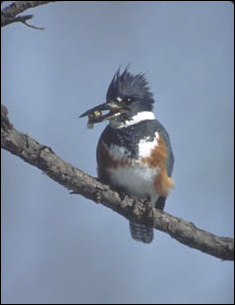
|
Context Kingdom: Animalia |
 |
Belted Kingfisher (Ceryle alcyon). Photograph courtesy of the U.S. Fish and Wildlife Service. |
This bird is about 13 inches in height. It has a large head and bill. The top of its head is crowned with a crest. The head and back are bluish and a blue band and a white collar run across the breast in both sexes (Sollenberger). Females have red on sides and across their belly, making the females more colorful than the males, a rarity among birds. Their feet are syndactyl; that is, the outer two toes are joined together for much of their length.
The Belted Kingfisher likes to live close to water. They often occur near water, sitting on tree limbs or telephone wires or in dead trees overhanging water.
During the spring they are found in Alaska, Canada, and throughout most of the United States. For the winter they tend to migrate to warmer areas, but a few males may be resident the year around, possibly to secure good territories in the spring (Johnson, 1997).
The Belted Kingfish primary eat fish. However they will eat other aquatic organisms, lizards, or insects.
These birds mate during spring and lay eggs once a year. The male and female share many tasks. One of these tasks is building the nest next to a river or stream. The nest is a tunnel in a steep embankment. It is usually about 6 inches in diameter and 6 ft long. The eggs are incubated for 22 days and both parents take turns (Johnson, 1997).
Johnson, S. 1997. "Belted Kingfisher" (online). The Conneticut River. Accessed 28 February 2006. http://www.bio.umass.edu/biology/conn.river/beltedkingfishe.html".
Sollenberger, L. "Belted Kingfisher" (online). Talk about wildlife. Accessed 28 February 2006. http://weaselhead.org/profile/?s=181.
Carylinda Serna, 2006.
